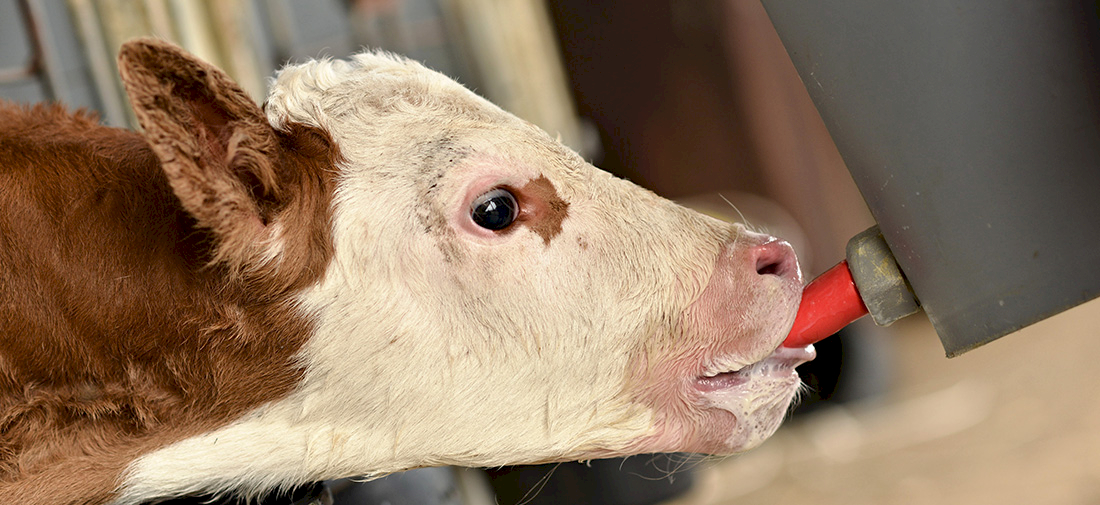Successful calf rearing
A matter of chance?
The first days of a calf's life set the basic for its healthy and productive adulthood: insufficient nutrient supply or the occurrence of diseases during the rearing phase both lower the performance of the adult animals and increase the risk of health problems and early cullings.
This was shown by numerous studies. Therefore, nothing should be left to chance during the rearing phase. But which factors affect calf development the most and how can they be influenced? Find out about the most important criteria for successful calf rearing in the next few lines.
An optimal rearing phase begins even before birth. Optimal care of the cow during the entire pregnancy, but especially in the weeks immediately before calving, should be a matter of course. But also, the reduction of stress factors as well as optimal hygiene during birth settle the way for an optimal start in life of newborn calves.
Another important, but sometimes underestimated factor is the colostrum supply. Although the importance of colostrum is much discussed, its practical implementation is still sometimes underrated. In addition to routine examination of the quality and quantity of the intaken colostrum, the transfer of immunoglobulins into the bloodstream should also be monitored regularly. These examinations can quickly reveal weaknesses in colostrum management.
Practice Tip
- Check each milked colostrum for its quality.
- Create a colostrum bank to be able to react quickly to insufficient quantities and qualities.
- Regularly check the immunoglobulin transfer into the calf's blood.
After colostrum supply, disease prevention plays another important role in successful calf rearing. Especially diarrheal diseases in the first 14 days of life reduce the development of young calves. Animals suffering from acute diarrhea must be immediately provided with sufficient electrolytes, buffer substances and energy to prevent their dehydration and the negative consequences thereof. It is also advisable to ensure that sick calves consume milk for as long as possible to guarantee their nutrient- and energy supply. Strict farm hygiene must be maintained to prevent diarrheal diseases. Additionally, it is recommended to build on high resistance and immunity of the animals directly from the beginning, to strengthen their defense against diarrhea causing pathogens.
Practice Tip:
- Clean and disinfect all top and contact vials in the calf area after each housing.
- React quickly to illnesses to reduce negative effects on the development.
- Support calves preventively, depending to the underlying problem.
Respiratory diseases are the second most common in the rearing phase. Again, acutely ill animals must be cared for quickly to minimize negative effects on development and long-term consequences. To prevent respiratory problems, care must be taken to ensure an adequate supply of fresh air, optimum humidity, and a low concentration of pollutants. Additionally, respiratory health can be supported through the targeted use of phytogenic components.
During the entire rearing phase, as with adult animals, care must be taken to ensure an optimal supply of nutrients. It should not be forgotten that calves have different nutritional needs than adult ruminants. In addition to the pure supply of nutrients, a fast and good rumen development should be promoted. Ensuring nutrient supply during the first weeks of life is done through high-quality milk replacer or whole milk. In addition, calves must also be offered a palatable and highly digestible concentrate and quality roughage from the first days of life. This promotes rumen development, thereby reducing nutrient losses during weaning and contributing to healthy and long-lived offspring.
In summary, it must be said that successful calf rearing is not a matter of chance! Therefore, make optimal use of the potentials of the rearing phase! This will not only optimize the well-being and health of your herd. It will also help to improve performance and thus your economic success.
Do you want more practical tips and advice for calf rearing? Then listen to our podcast, in which Dr. Joachim Lübbo Kleen, practical veterinarian and expert in calf rearing, shares his experiences with us.
Are you looking for innovative and solution-oriented products to optimize your portfolio around calf rearing? Then talk to your MIAVIT contact now.
